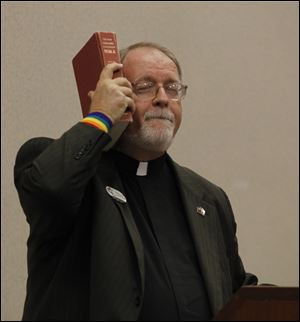
Churches need to do more than tolerate gays, pastor says
Dueling billboards drew cleric to area
10/29/2011
The Rev. Stephen Sprinkle, a gay Baptist minister from Dallas, says that the Bible and church teachings don't necessarily condemn homosexuality; the Ten Commandments don't even mention it.
The Rev. Stephen Sprinkle, an openly gay Baptist minister from Dallas, said it's not enough for churches to be "tolerant" of gays, lesbians, bisexuals, and transgender people. They need to "move from tolerance through understanding to appreciation and celebration."
The minister, a professor of practical theology at Brite Divinity School at Texas Christian University, was invited to Toledo partly in response to billboard wars between two local churches over homosexuality. Central United Methodist Church posted a billboard saying, "Being Gay Is a Gift from God," which spurred the Church on Strayer to buy nine billboards that proclaimed, "Being Gay Is NOT a Gift from God -- Forgiveness, Love, and Eternal Life Are."
Mr. Sprinkle, 60, who has a doctorate in systematic theology from Duke Divinity School, said in his lecture Monday night in the University of Toledo Student Union that organized religion is the main cause of "hostility and alienation" against lesbian, gay, bisexual, transgender, and queer (LGBTQ) persons.
Gays have responded to the hostility in three ways, he said: "founding their own faith communities; retreating into their own spiritual closets and becoming numb to the neglect and abuse, or leaving altogether."
But "the devilish notion that the Bible and Christian teachings are necessarily and irreconcilably condemning and rejecting of LGBTQ people and their practices … just isn't true," Mr. Sprinkle said.
He said scholars are finding that the Bible and church teachings are not necessarily hostile to same-sex love and desire.
John Boswell of Yale University, for example, said that "neither the Bible nor the traditions of the church up until at least the 13th and 14th centuries in Europe were as negative toward same-gender loving people as at first believed," Mr. Sprinkle said, adding that "Christianity emerged in the midst of a homosexual-tolerant world of the Greeks and the Romans."
He said Peter Gomes of Harvard University asserts that the biblical concept of hospitality extends to those who have been deliberately excluded, including "the poor, the discriminated against, persons of color, homosexuals, women, and all persons beyond the conventional definitions of Western civilization."
Mr. Sprinkle also said that homosexuality "is not mentioned in the Top Ten [Commandments]" and it is "not in the message of any prophet. Homosexuality was not much of a concern for the early churches."
Gays and lesbians have much to offer to faith communities, he said, urging LGBTQ people to realize that "internalized homophobia is within our power to change, and that we have the resources of God's grace to give us the courage to break our silence."
During a question-and-answer session, Mr. Sprinkle described God as "queer" for creating a world of diversity, creating humankind in his own image, and for loving all creation.
"God loves us who are God's creation. We're not the same. That's queer. That's very queer," he said. "And I say that God is queer. God is the original queer because God is loving across lines."
Mr. Sprinkle said LGBTQ people "offer their 'Queer Eye' to straight Christians, so they may catch a glimpse of a new creation that celebrates all people."
-- David Yonke